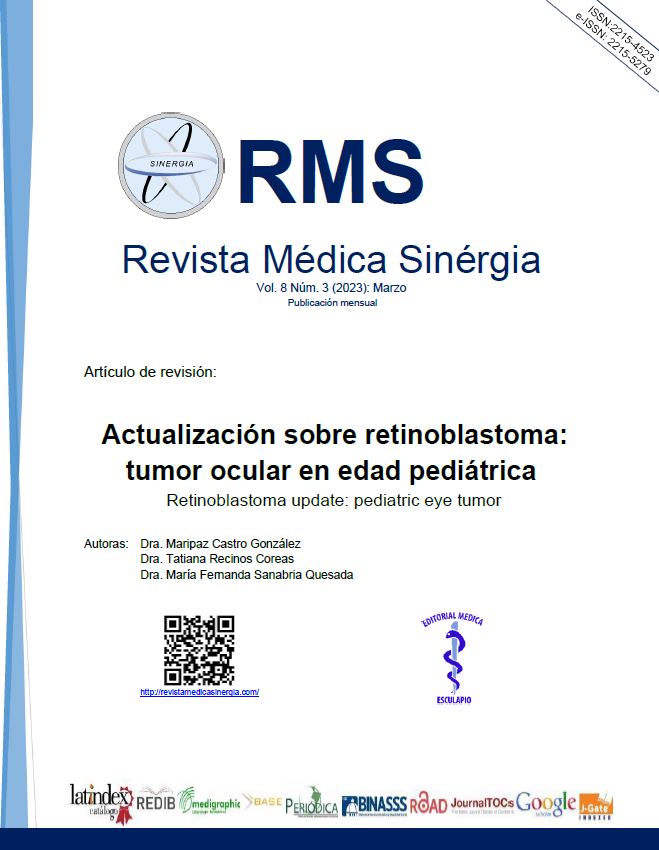Abstract
Retinoblastoma is the most common malignant intraocular tumor globally, derived from neuroectodermal tissue, occurring between birth and six years of age. It originates in the neural retina and can be unilateral (60%) or bilateral (40%). It is associated with hereditary genetic factors such as the mutation of both alleles in the RB1 gene. Its distinctive sign is leukocoria, followed by strabismus and in advanced cases proptosis. Its diagnosis is made by eye fundus but studies such as ocular ultrasound, tomography or magnetic resonance help to evaluate its extension. The treatment is based on staging, thus assessing its laterality, location, size and extension, among the main methods are chemotherapy, local therapies, radiotherapy and enucleation.
Keywords
References
Pérez MA, Domínguez PM. El retinoblastoma: un tumor de ojo frecuente en la infancia. Revista de la Facultad de Medicina de la UNAM. 2019; 62:4. Disponible en http://doi.org/10.22201/fm.24484865e.2019.62.4.05
Gupta H, Malaichamy S, Mallipatna A, Murugan S, Jeyabalan N, Badu VS, et al. Retinoblastoma genetics screening and clinical management. BMC Med Genomics. 2021;14:188. Disponible en https://doi.org/10.1186/s12920-021-01034-6
Elfalah M, AlNawaiseh T, Atoum D, AlKhassawneh A, Mohammad M, AlNawaiseh I, et al. Improving medical students awareness about retinoblastoma: a practical strategy. Clinical Ophthalmology. 2022;16:1807–1814. Disponible en https://doi.org/10.2147/OPTH.S355876
Brenes N, Osejo MS, Cartín AC. Presentación del retinoblastoma en la edad pediátrica. Revista Médica Sinergia. 2020;5. Disponible en https://doi.org/10.31434/rms.v5i5.379
Gu X, Xie M, Jia R, Ge S. Publication Trends of Research on Retinoblastoma During 2001–2021: A 20-Year Bibliometric Analysis. Frontiers in Medicine. 2021; 8:675703. Disponible en https://doi.org/10.3389/fmed.2021.675703
Ancona-Lezama D, Dalvin LA, Shields CL. Modern treatment of retinoblastoma: A 2020 review. Indian J Ophthalmol. 2020;68:2356-65. Disponible en https://doi.org/10.4103/ijo.IJO_721_20
Gündüz AK, Mirzayev I, Temel E, Ünal E, Taçyıldız N, Dinçaslan H, et al. A 20-year audit of retinoblastoma treatment outcomes. The Royal College of Ophthalmologist. 2020; Eye 34, 1916–1924. Disponible en https://doi.org/10.1038/s41433-020-0898-9
Machín E, Bermúdez V, Garicano C, Ortega Á, Rojas M, Ramírez P. Retinoblastoma: un enfoque molecular, clínico y terapéutico. Archivos Venezolanos de Farmacología y Terapéutica. 2017;36(5):115-131. Disponible en https://www.redalyc.org/articulo.oa?id=55954942003
AlAli A, Kletke S, Gallie B, Lam WC. Retinoblastoma for Pediatric Ophthalmologists. Asia-Pacific Journal of Ophthalmology. 2018;7:160–168. Disponible en https://doi.org/10.22608/APO.201870
Dimaras H, Corson TW. Retinoblastoma, the visible CNS tumor: A review. Journal of Neuroscience Research. 2018;1–16. Disponible en https://doi.org/10.1002/jnr.24213
Ossandón D, Zanolli M, Pérez V, Rojas T, Quijarro P, Kabalan P, et al. Manejo multidisciplinario en retinoblastoma: experiencia en 37 ojos. Archivos de la Sociedad Española de Oftalmología. 2015;90(2):55–62. Disponible en https://doi.org/10.1016/j.oftal.2014.09.015
Reynolds M, Sein J, Hayashi R, Lueder G. Treatment of small and medium retinoblastoma tumors with Iris diode laser. European Journal of Ophthalmology. 2021;31(6):3318–3323. Disponible en https://doi.org/10.1177/1120672121991390
Sarver AL, Xie C, Riddle MJ, Forster CL, Wang X, Lu H, et al. Retinoblastoma tumor cell proliferation is negatively associated with an immune gene expression signature and increased immune cells. Laboratory Investigation. 2021;101:701–718. Disponible en https://doi.org/10.1038/s41374-021-00573-x
Castela G, Providência J, Monteiro M, Silva S, Brito M, Sá J, et al. Characterization of the Portuguese population diagnosed with retinoblastoma. Scientifc Reports 2022; 12:4378. Disponible en https://doi.org/10.1038/s41598-022-08326-6
Ido Didi F, Stacey AW, Bowman R, Khetan V, Blum S, Keren-Froim N, et al. Retinoblastoma management during the COVID-19 pandemic: A report by the Global Retinoblastoma Study Group including 194 centers from 94 countries. Pediatric Blood and Cancer. 2020;e28584. Disponible en https://doi.org/10.1002/pbc.28584

This work is licensed under a Creative Commons Attribution-NonCommercial 4.0 International License.
Copyright (c) 2023 Array


